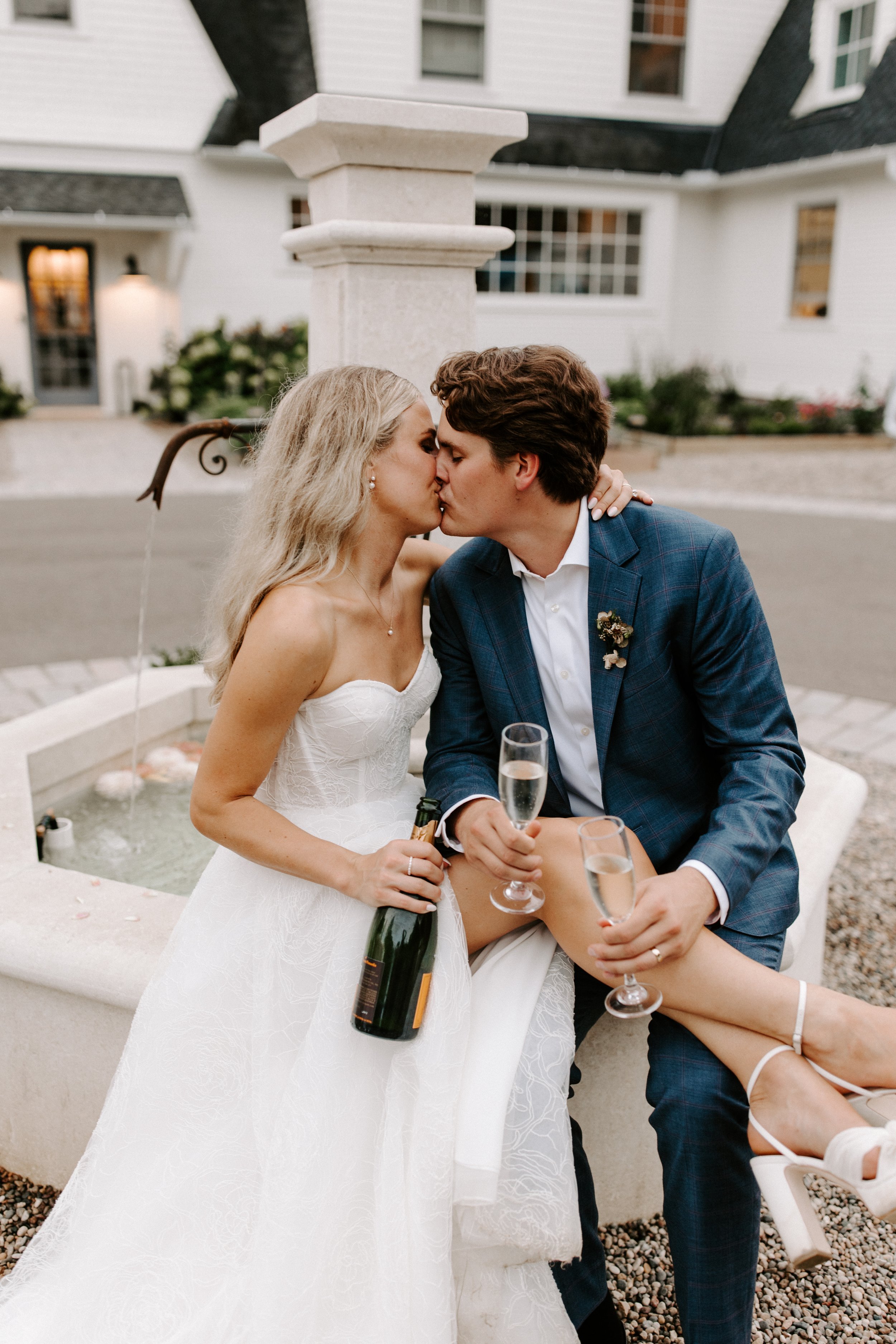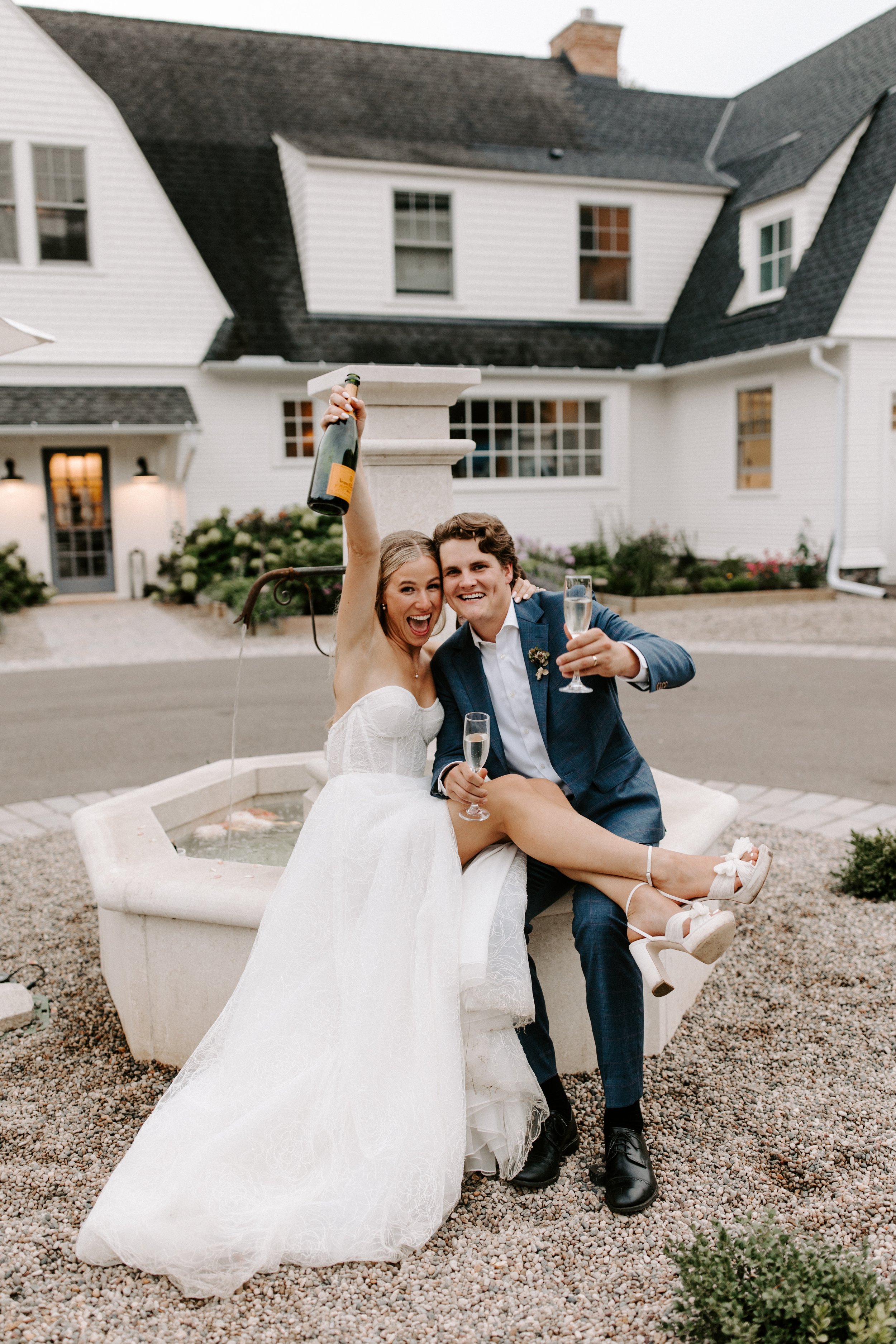What Information to Include On Your Wedding Website
We all want our wedding day to be stress-free and nothing but fun! One of the most important components of having a seamless wedding day (aside from hiring a wedding planner, of course) is well-informed guests. This means clearly communicating all wedding details from the date and location, to travel information, RSVP deadlines, or even special traditions you want everyone to partake in. One of the best ways to do this is by creating a wedding website!
Your wedding website is where you can direct all friends and family to find information about your special day – and having a website set up ensures everyone is receiving the same details. There is so much information that you want to let guests know, however, you don’t want to overwhelm them either. As your wedding planners, we’ve put together the key details that your wedding website needs to have to have and tips to make sure your site is easily readable.
When To Build Your Wedding Website
We recommend creating your wedding website at least 6-8 months in advance. But, if you have a specific URL you want to nab, do it as soon as you get engaged – or before ;) Once details are confirmed like the date, venue, and formalities you can begin adding these details to your site. Definitely take advantage of the privacy features and make sure to “lock” your site with a password until you’re ready to share with your guests. You will only include the URL to your wedding website on your invitations, so no need to rush to get everything posted when save the dates are sent!
Our couples have built their wedding websites using With Joy, Riley Grey, The Knot, Minted, and Zola. Each platform is pretty user-friendly and which you choose may depend on where you order invites (if you want them to match your website) and your preference for free templates versus purchasing an elevated site.
The Pages and Details Your Wedding Website Needs to Have
Based on the information we know guests are looking for, there are five must-have main pages that your wedding website needs to have:
1) Homepage
Obviously, this is the page your guests will see first. At the very least, this should feature your names, the date and venue, and a quick thank you of sorts to guests; “We are so excited to celebrate with you!” or “You’re invited to join the party!” We also suggest adding a few photos of the two of you or your venue and listing the Order of Events (the start time of the ceremony, social hour, dinner, dancing, and when the event ends).
2) Our story
A page to share more about how you met, your engagement, why you chose the venue you did, anything fun you want to share with guests! Guests love to see your photos and read your love story! Your wedding is a fun and meaningful celebration so include your story on your website rather than just being straightforward with details.
3) RSVP
Whether you are collecting RSVPs digitally or by mail, we strongly recommend creating a dedicated webpage to reiterate RSVP details. This page should include the RSVP deadline and how to RSVP.
If collecting online, provide the link / form for guests to use.
If collecting by mail, state that you’ve mailed out the RSVP response cards with pre-addressed envelopes in the invitations. Include a note such as, “If you’ve lost the response card or envelope, please call/email XYZ so we can record your response.”
Dani & Jake’s wedding invitations and RSVP response card // Jessica Smith Photography
4) Travel
It’s important to let your wedding guests know what travel is going to look like on your wedding day. A “Travel” page (sometimes also labeled “Transportation”) will help guests understand how they will arrive to the venue and where they should stay while in town. This includes details such as parking, guest shuttles, and hotel blocks.
A few things you’ll want to make super clear:
Are there parking restrictions, such as if cars cannot be left overnight at the venue or if the only parking available is street parking or a nearby pay-ramp?
Are you providing a guest shuttle? If so, from what hotel(s)? Is it a round-trip (TO and FROM the venue) or only making return trips back to the hotel at the end of the night?
If you have hotel blocks with discounted rates, make sure to share with guests any codes/names they need to mention when booking and by what date they have to book their room.
You may also want to include a fun section for “Things to do in town!” to keep your guests entertained pre- and post-wedding. Especially if you’re planning on having out-of-state guests, give them some fun things to do while they are staying in your city. These could be meaningful places to you, or even a “map” of your love story with places you’ve been on dates or where you got engaged.
5) FAQs
This is the page to provide short & sweet answers to questions your guests’ will inevitably have. Think the quick things people might be wondering– Dress code? Kids? Most people like to know what to expect when attending a wedding, so they will definitely be thinking about these things. Even reiterating seemingly common-sense answers (“What time is the ceremony?”) will help ensure your guests are on the same page and there are less surprises on wedding day!
Sarah & Jorgen’s wedding website FAQ page
Include items such as:
Dress Code/Attire: If you have a specific vibe for your wedding, or you just want to lend your wedding guests a helping hand about certain venue nuances, guests will want to know so they can dress for the occasion!
Some examples of this could be: “Black Tie Formal – we’re classy like that!” or “Leave Your Heels At Home – there is a short walk to the ceremony site and social hour is on the lawn.”
Are Kids Invited?: When making this decision, keep in mind the kind of environment you are planning to have at your wedding. Whether or not you want a kid-free wedding is totally a personal preference – but it may have some impact on who will attend. Letting people know ahead of time, and very clearly communicating your expectations can help alleviate any tension.
If kids will not be invited, we recommend saying something like: “While we love your little ones, our wedding is going to be an adults-only event so that everyone can relax and enjoy the evening. We appreciate you making childcare arrangements ahead of time so you can celebrate with us.”
Do I Get A Plus One?: Yes… no… maybe? hell no! Inviting plus ones is usually dependent on your wedding budget, the maximum number of guests your venue can accommodate, and your personal connection/relationship with the invitee. If you choose not to invite plus ones, some guests may not get the memo from their invitation. To help clear things up, include a note on your wedding website such as: “Invitations were addressed to all invited and your envelope will include your partner's name or "and guest" if we have room for a plus one. Due to the venue capacity, we appreciate your understanding.”
Whatever you determine, STICK TO IT. If plus ones are not invited, do not make an exception for cousin Chris or aunt Anne. If any guests continue to inquire about bringing their plus one, you can always blame venue capacity or budget.
Overall, creating a wedding website is one of the best ways to communicate event information with your guests. Our couples typically spend roughly ~2-3 hours editing their wedding websites and adding their event details. For the sake of your sanity and keeping guests on the same page, we think that is so worth it!
To recap, a good wedding website needs a Homepage with the critical event details (date, time, location), Travel/Transportation page so guests know how to get where they’re going, an RSVP page to ensure you get those responses on time, a page dedicated to the two of you and your story, and a Frequently Asked Questions page. That’s a lot of info! But, those are the must-haves. We’ve helped coordinate and plan so many weddings that we can confidently say your guests will be wedding-ready when you’ve communicated each of those things on your wedding website.
If you include all of the key details we’ve shared, your wedding website will be the go-to for answering all questions about your day. Family friend texting you again with questions? *link sent*
And, if you want to share additional information… some optional pages to include:
Wedding Party - the who’s who and short bios of your wedding attendants. Typically, this is a bit silly, with funny stories of how you met each person, their role in your life, or their nicknames.
Gallery / Photos - a page to include all of your engagement photos, or pictures from your first date and special moments.
Registry - If you are setting up a gift registry or asking for donations to any charities, include a page that identifies where you are registered and includes links to online registries, or provide information on your preferred charities.
Timeline - Some couples like to include a specific page for the timeline. This can be as simple as reiterating the start time of the ceremony and times for the social hour, dinner, dancing, and when the event ends. We don’t suggest adding any more timeline details because it’s simply more information than your guests need!
Weekend Activities - If you are having a Welcome Party or a post-wedding brunch, this is the page to include those additional details for guests like the time and location, if they need to RSVP separately for those events, and if you are hosting the event or if guests are welcome to join but will pay for their own food or beverages.
Photos above: Sarah & Jorgen sharing a celebratory champagne toast // HL Photo




